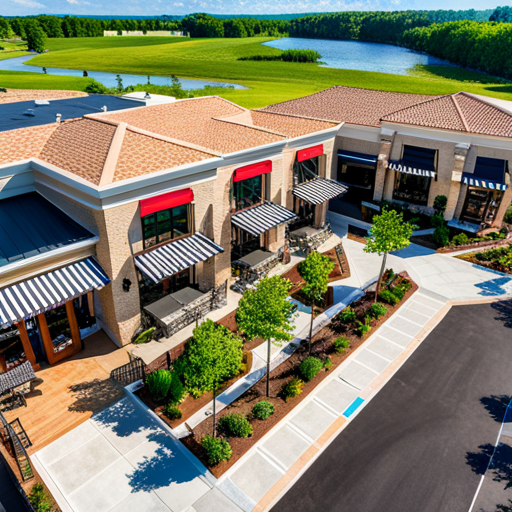The Ultimate Guide to Soft Washing Your RV: Tips, Techniques, and Recommended Chemicals
Soft washing is a highly effective method for cleaning and maintaining the exterior surfaces of RVs. Unlike traditional pressure washing, which can be too harsh and potentially damage the delicate surfaces of an RV, soft washing utilizes a gentler approach to remove dirt, grime, and stains.
One of the key benefits of soft washing is its ability to thoroughly clean without causing any harm to the RV’s paint, decals, or delicate surfaces. By using low-pressure techniques and specialized cleaning solutions, soft washing ensures a deep clean while preserving the integrity of the RV’s exterior.
When it comes to soft washing, the choice of chemicals is crucial. It is essential to use safe and effective cleaning solutions that are specifically designed for RVs. These chemicals not only provide excellent cleaning results but also protect the surfaces from potential damage.
For RV owners in coastal Georgia, soft washing is particularly relevant due to the unique challenges posed by the coastal environment. The combination of saltwater exposure, humidity, and other environmental factors can lead to the accumulation of dirt, algae, and other contaminants on the RV’s exterior. Soft washing offers a reliable solution to keep your RV looking its best and protected from the harsh coastal elements.
Understanding Soft Washing for RVs
When it comes to cleaning your RV, it’s important to understand the difference between soft washing and pressure washing. While pressure washing relies on high-pressure water to remove dirt and grime, soft washing takes a gentler approach.
Soft washing is a cleaning method that utilizes low-pressure water combined with specialized cleaning solutions to effectively clean surfaces without causing damage. This makes it particularly suitable for RVs, which have delicate surfaces that can be easily scratched or damaged by high-pressure methods.
One of the main risks of using high-pressure methods on RV surfaces is the potential for water intrusion. The forceful spray can penetrate seals and cause water to seep into the interior of the RV, leading to costly repairs and potential mold growth. Soft washing eliminates this risk by using a gentle stream of water that won’t compromise the integrity of your RV.
Moreover, soft washing is highly effective in removing dirt, algae, mold, and other contaminants that can accumulate on your RV’s exterior. The specialized cleaning solutions used in soft washing are designed to break down and remove these substances without causing any harm to the surface.
By opting for soft washing instead of pressure washing, you can ensure that your RV is thoroughly cleaned while minimizing the risk of damage. This gentle approach is essential for maintaining the longevity and appearance of your RV, allowing you to enjoy your travels without worrying about the condition of your vehicle.
Choosing the Right Chemicals
When it comes to soft washing your RV, using the right chemicals is crucial for achieving effective and safe results. RV-safe chemicals are specifically formulated to clean and protect the delicate surfaces of your vehicle without causing any damage. This section will highlight the importance of using RV-safe chemicals, discuss the specific challenges faced by RVs in coastal GA, and provide a list of recommended chemicals for soft washing RVs.
Importance of Using RV-Safe Chemicals
Using RV-safe chemicals is essential to ensure the longevity and appearance of your vehicle. These specially formulated products are designed to remove dirt, grime, mold, and mildew without causing any harm to the delicate surfaces of your RV. Unlike harsh chemicals, RV-safe solutions are gentle yet effective, providing a thorough clean without compromising the integrity of your RV’s paint, decals, or other exterior materials.
Challenges Faced by RVs in Coastal GA
RVs in coastal GA face unique challenges due to exposure to saltwater. Saltwater can be corrosive and can cause damage to the exterior surfaces of your RV if not properly cleaned and protected. It is important to choose chemicals that are specifically formulated to combat the effects of saltwater exposure and prevent any potential damage.
Recommended Chemicals for Soft Washing RVs
Here is a list of recommended chemicals that are safe and effective for soft washing RVs:
- RV-specific cleaning solutions: These products are specifically designed for cleaning RV exteriors and are safe to use on all surfaces.
- Mild detergents: Gentle detergents that are free from harsh chemicals can effectively remove dirt and grime without causing any damage.
- Oxidizing agents: These chemicals help to remove stains and discoloration caused by environmental factors, such as saltwater exposure.
- Mold and mildew removers: Look for products that are specifically formulated to eliminate mold and mildew without harming the RV’s surfaces.
It is important to follow the manufacturer’s instructions and dilution ratios when using these chemicals. Always test a small, inconspicuous area before applying the solution to the entire RV to ensure compatibility and avoid any potential damage.
By choosing the right chemicals for soft washing your RV, you can effectively clean and protect your vehicle, ensuring its longevity and maintaining its pristine appearance.
Recommended Soft Washing Techniques
Soft washing an RV involves a specific process to ensure effective cleaning without causing any damage to the vehicle’s surfaces. By following these step-by-step techniques and utilizing the appropriate dilution ratios for the recommended chemicals, you can achieve optimal results during the soft washing process.
Step 1: Preparing the RV
Before starting the soft washing process, it’s essential to prepare the RV properly:
- Remove any loose items, such as awnings, outdoor furniture, or decorations.
- Cover delicate areas, such as vents, windows, and electrical components, to protect them from overspray.
- Inspect the RV for any existing damage or areas that require special attention.
Step 2: Applying the Cleaning Solution
Once the RV is prepared, follow these steps to apply the cleaning solution:
- Fill a soft washing sprayer or a low-pressure power washer with the recommended cleaning solution.
- Starting from the top, apply the solution evenly across the RV’s surfaces.
- Allow the cleaning solution to dwell for the recommended amount of time, usually around 10-15 minutes.
- Avoid letting the solution dry on the surface, as it may leave streaks or residue.
Step 3: Gentle Agitation and Rinse
After the cleaning solution has dwelled, gently agitate the surfaces using a soft brush or sponge to loosen any dirt or grime:
- Work in small sections, starting from the top and moving downwards.
- Use gentle, circular motions to avoid scratching the RV’s surfaces.
- Rinse each section thoroughly with a low-pressure water stream, ensuring all the cleaning solution is removed.
Step 4: Drying and Inspection
Once the RV has been rinsed, follow these final steps:
- Use a soft, microfiber cloth or chamois to dry the surfaces, preventing water spots.
- Inspect the RV for any missed spots or areas that require additional cleaning.
- Touch up any remaining dirt or stains using a gentle cleaning solution and a soft brush.
Remember, always refer to the manufacturer’s instructions for the recommended dilution ratios of the cleaning chemicals. Using the correct ratios ensures the safety of your RV’s surfaces and maximizes the effectiveness of the cleaning process.
To achieve optimal results during the soft washing process, consider the following tips and tricks:
- Work in shaded areas or during cooler times of the day to prevent the cleaning solution from drying too quickly.
- Start with the least aggressive cleaning solution and gradually increase strength if necessary.
- Test the cleaning solution on a small, inconspicuous area of the RV before applying it to the entire surface.
- Use a soft bristle brush or sponge specifically designed for RV cleaning to avoid scratching the surfaces.
- Work systematically, ensuring complete coverage of all surfaces.
By following these recommended soft washing techniques and implementing the appropriate dilution ratios, you can effectively clean your RV without causing any damage. Remember to prioritize safety and take your time to achieve the best results.
Safety Precautions
When it comes to soft washing your RV, safety should always be a top priority. Here are some important safety precautions to keep in mind:
Emphasize the importance of wearing protective gear during soft washing.
Before you begin the soft washing process, it is crucial to protect yourself from potential hazards. Make sure to wear the following protective gear:
- Safety goggles or glasses to shield your eyes from chemical splashes.
- Rubber gloves to protect your hands from direct contact with the cleaning solutions.
- A long-sleeved shirt and pants to cover your skin and minimize exposure.
- Non-slip shoes to ensure stability while working on wet surfaces.
By wearing the appropriate protective gear, you can minimize the risk of accidents and protect yourself from any potential harm.
Discuss the potential environmental impact of using certain chemicals.
While soft washing is an effective cleaning method, it is essential to be mindful of the potential environmental impact of the chemicals used. Some cleaning solutions may contain ingredients that can be harmful to plants, animals, or water sources if not used responsibly.
When selecting chemicals for soft washing your RV, opt for environmentally friendly options whenever possible. Look for biodegradable and eco-friendly products that are specifically formulated for use in outdoor settings. These products are designed to minimize harm to the environment while still effectively cleaning your RV.
Provide guidelines for proper disposal of soft washing chemicals.
After completing the soft washing process, it is crucial to dispose of the cleaning solutions properly. Improper disposal can lead to contamination of water sources and harm the environment. Follow these guidelines for safe disposal:
- Do not pour the used cleaning solutions down storm drains or directly onto the ground.
- Check local regulations and guidelines for proper disposal methods in your area.
- Consider using a containment system or collecting the runoff to prevent it from entering storm drains.
- Dispose of the cleaning solutions at designated collection points or through a professional waste disposal service.
By following these guidelines, you can ensure that the chemicals used during the soft washing process do not pose a risk to the environment.
Remember, safety and environmental responsibility go hand in hand when it comes to soft washing your RV. By taking the necessary precautions and using environmentally friendly products, you can enjoy a clean RV while minimizing any potential harm.
Maintaining the Cleanliness of Your RV
Keeping your RV clean and protected is essential for its longevity and overall appearance. Regular maintenance, including soft washing sessions, can help maintain the cleanliness and condition of your RV. Here are some suggestions and tips to help you keep your RV in top shape:
Regular Maintenance
- Wash your RV regularly using a mild soap and water solution. This will help remove dirt, dust, and other debris that can accumulate on the exterior.
- Inspect and clean the roof of your RV at least twice a year. Remove any leaves, branches, or other debris that may have been collected on the roof.
- Check and clean the gutters and downspouts to ensure proper drainage and prevent water damage.
- Inspect the seals and caulking around windows, doors, and vents. Repair or replace any damaged or deteriorated seals to prevent water leaks.
- Keep the interior of your RV clean and organized. Regularly vacuum and dust to remove dirt and allergens.
The Benefits of Routine Soft Washing
Scheduling routine soft washing sessions for your RV offers several benefits:
- Preserves the Exterior: Soft washing helps remove dirt, grime, mold, and mildew from the exterior surfaces of your RV. This not only improves its appearance but also helps prevent damage caused by these contaminants.
- Protects the Paint: Soft washing is gentle on the paint of your RV, preventing any potential damage that high-pressure washing methods may cause.
- Extends Lifespan: Regular soft washing sessions can help extend the lifespan of your RV by preventing the buildup of harmful substances that can lead to deterioration.
- Maintains Value: Keeping your RV clean and well-maintained through routine soft washing can help maintain its resale value.
Tips for Preventing Common Issues in Coastal GA
Coastal GA presents unique challenges for RV owners due to saltwater exposure and other environmental factors. Here are some tips to help prevent common issues:
- Rinse Off Saltwater: After trips to the coast, rinse off your RV thoroughly to remove any saltwater residue. Salt can cause corrosion and damage to the exterior surfaces.
- Protect Against Sun Damage: Coastal areas often have intense sun exposure. Use UV protectant products on your RV’s exterior to prevent fading and damage caused by UV rays.
- Check for Water Leaks: Regularly inspect your RV for any signs of water leaks, especially around windows, doors, and vents. Promptly address any issues to prevent further damage.
- Store Properly: When not in use, store your RV in a covered area or use a protective cover to shield it from the elements.
By following these maintenance tips and scheduling routine soft washing sessions, you can ensure that your RV remains clean, protected, and in optimal condition for your future adventures.
Conclusion
In conclusion, soft washing is a highly beneficial method for cleaning RVs, offering a gentle and effective solution for removing dirt, grime, and other contaminants. By opting for soft washing instead of high-pressure methods, RV owners can ensure the longevity and appearance of their vehicles.
Using safe and effective chemicals is crucial when it comes to soft washing RVs. The right chemicals not only provide optimal cleaning results but also protect the surfaces of the RV from damage. It is essential to choose RV-safe chemicals that are specifically designed for soft washing applications.
If you are an RV owner in coastal GA, soft washing is particularly important due to the exposure to saltwater and other coastal elements. These factors can accelerate the deterioration of your RV’s exterior, making regular soft washing a necessity to maintain its cleanliness and protect its value.
At Aquawash, we understand the unique needs of RV owners in coastal GA and offer professional soft washing services tailored to your RV’s requirements. Our team of experts is equipped with the knowledge and experience to handle the soft washing process effectively, ensuring your RV receives the care it deserves.
By scheduling a soft washing service with Aquawash, you can have peace of mind knowing that your RV will be cleaned using safe and effective chemicals, leaving it looking refreshed and rejuvenated. Our goal is to provide exceptional service and exceed your expectations, helping you maintain the cleanliness and appearance of your RV for years to come.
Don’t wait any longer to give your RV the care it deserves. Contact Aquawash today to schedule a soft washing service and experience the difference for yourself.
FAQs:
1. Q: What is the difference between soft washing and pressure washing?
A: Soft washing uses low-pressure water and specialized cleaning solutions, while pressure washing relies on high-pressure water to clean surfaces.
2. Q: Why is it important to use RV-safe chemicals for soft washing?
A: RV-safe chemicals are specifically formulated to clean and protect the delicate surfaces of RVs without causing any damage.
3. Q: How often should I soft wash my RV?
A: It is recommended to soft wash your RV at least once or twice a year, depending on the level of dirt and environmental conditions.
4. Q: Can I use regular household cleaning solutions for soft washing my RV?
A: It is best to use cleaning solutions that are specifically designed for RVs, as regular household cleaners may contain harsh chemicals that can damage the surfaces.
5. Q: What are the benefits of soft washing my RV?
A: Soft washing helps preserve the exterior, protects the paint, extends the lifespan, and maintains the value of your RV.
Key Take Away
- Soft washing is a highly effective and gentle method for cleaning and maintaining RV exteriors, providing thorough cleaning without causing damage to delicate surfaces.
- Using RV-safe chemicals is crucial for soft washing, ensuring effective cleaning results while protecting the integrity of the RV’s paint, decals, and other exterior materials.
- RVs in coastal areas like Coastal Georgia face unique challenges due to saltwater exposure, making regular soft washing essential to prevent damage and maintain the RV’s appearance.
- Soft washing involves specific techniques, such as gentle agitation and rinsing, to achieve optimal cleaning results and ensure the safety of the RV’s surfaces.
- Prioritizing safety and environmental responsibility during soft washing is vital, including wearing protective gear, using eco-friendly products, and proper disposal of cleaning solutions.
Glossary
- Soft Washing: A gentle and effective method of cleaning RV exteriors using low-pressure water and specialized cleaning solutions to avoid damage to delicate surfaces.
- Pressure Washing: A high-pressure cleaning method that can potentially harm RV surfaces, making it less suitable for maintaining the vehicle’s exterior.
- RV-Safe Chemicals: Cleaning solutions specifically formulated to clean RV exteriors without causing damage to paint, decals, or other surfaces.
- Coastal GA: Refers to the coastal region of Georgia, where RVs face unique challenges due to saltwater exposure, humidity, and other environmental factors.
- Oxidizing Agents: Chemicals that help remove stains and discoloration caused by environmental factors, such as saltwater exposure.
- Mold and Mildew Removers: Products designed to eliminate mold and mildew without harming the surfaces of an RV.
- Dilution Ratios: Recommended ratios for mixing cleaning solutions to ensure safety and optimal cleaning results during soft washing.
- UV Protectant: Products used to protect RV exteriors from sun damage and fading caused by intense sun exposure in coastal areas.
- Water Intrusion: The risk of water seeping into the interior of an RV due to forceful pressure washing, potentially leading to costly repairs and mold growth.
- Environmental Responsibility: The practice of using eco-friendly products and responsible disposal methods to minimize the environmental impact of soft washing.


